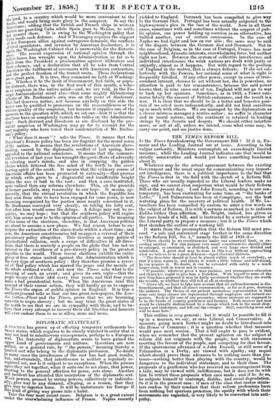DIPLOMATIC STATECRAFT.
A PRACTICE has grown up of effecting temporary settlements be- tween states, which requires to be closely watched in order, that it may not lead th mischievous consequences, perhaps to a European war. The fraternity of diplomatists seems to have gained the upper hand of governments and nations. Questions are now settled, as a general rule, by "the powers," meaning thereby a limited sect who belong to the diplomatic profession. No doubt m many eases the interference of the sect has had good results, but, .unfortunately, that interference is neither a regularly re- cognized act, nor is it subject to no exceptions. When the powers agree they act together, when it suits one to act alone, that power, tru,st,ing to the general affection for peace, acts alone. Another evil incident has attended this usurpation of the diplomatic sect. Weak powers, pressed by strong powers, collectively or individu- ally, give way to any demand, alleging, as a reason, that they give way to superior force. It will be unfortunate for Europe if this kind of giving way grows into a habit.
Take the four most recent cases. Belgium is to a great extent under the overwhelming influence of France. Naples recently yielded to England. Denmark has been compelled to give way to the German Diet. Portugal has been actually subjected to the highwayman's plea in the face of the world. Now in all these cases, sometimes with and sometimes without the support of pub- lic opinion, one power holding up coercion as an alternative, has bullied another, out of certain concessions. In the case of Naples we had right and law on our aide; the same may be said of the dispute between the German diet and Denmark. But in the case of Belgium, as in the ease of Portugal, France has near neighbourhood, dynastic interests, overwhelming force, but neither right nor law. Between the system of collective interference and individual interference the weak nations are dealt with justly or unjustly, almost as it happens. But with regard to the position of England in the matter, that is always delicate. If she act col- lectively with the Powers, her national sense of what is right is frequently falsified. If any other power, except in eases of tran- scendant interest, chooses to act without her, she is powerless, no attention is paid to her remonstrances, because the said power knows that, in nine cases out of ten, England will not go to war to back up her opinions. Sometimes, as in 1853, a Power esti- mates falsely the amount of British endurance, and the result is a war. It is clear that we should be in a better and honest,er posi- tion if we acted more independently, and did not bind ourselves up so much with others. We are managed by the diplomatists as a clever mistress manages a restive suitor ; we suffer in character and in moral nature, and the continent is retained in leading strings by the Jesuits and despots. We should either interfere more, or not at all, unless we intend, come what come may, to carry our point, and see justice done.


























 Previous page
Previous page